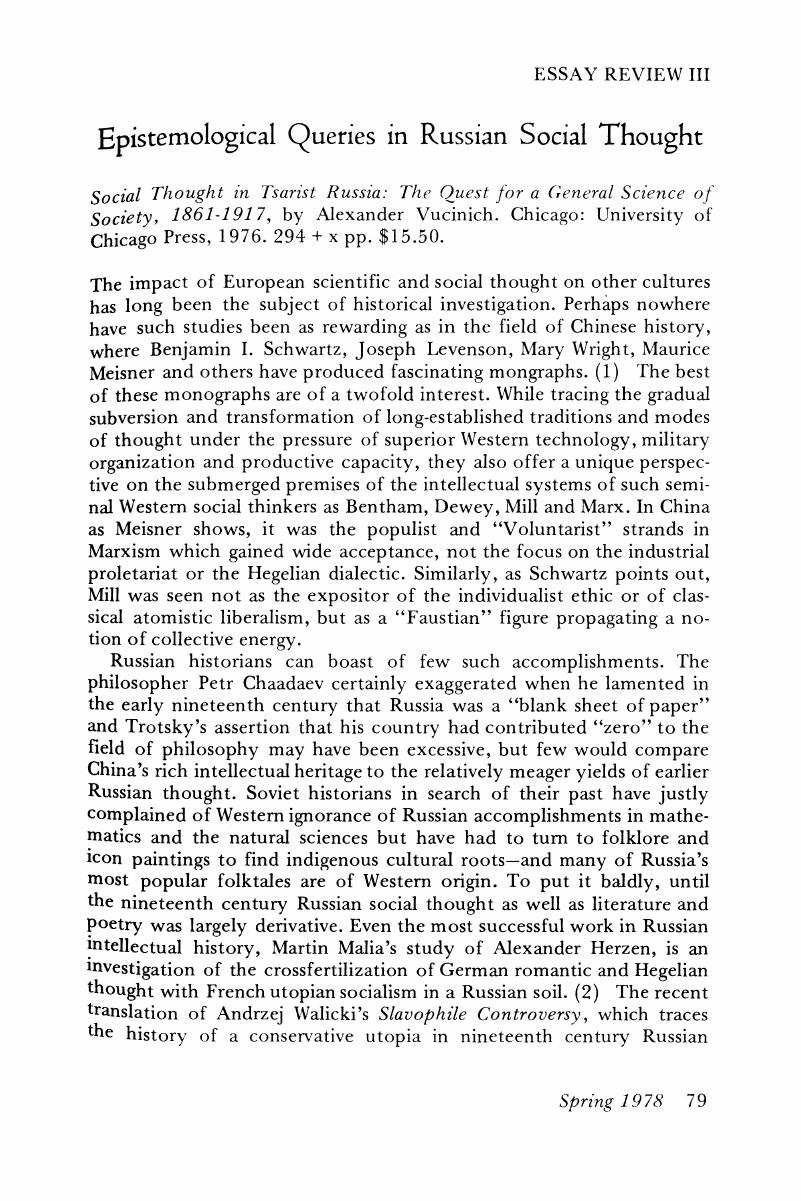No CrossRef data available.
Article contents
Epistemological Queries in Russian Social Thought
Published online by Cambridge University Press: 24 February 2017
Abstract

- Type
- Essay Reviews
- Information
- Copyright
- Copyright © 1977 by New York University
References
Notes
1. Schwartz, Benjamin I., In Search of Wealth and Power: Yen Fu and the West (Cambridge, Mass., 1964); Levenson, Joseph, Liang Ch'i-ch'ao and the Mind of Modern China, (Berkeley, Calif., 1967); Meisner, Maurice, Li Ta-Chao and the Origins of Chinese Marxism, (Cambridge, Mass., 1967); Wright, Mary C., The Last Stand of Chinese Conservatism: (Cambridge, Mass., 1962); Wakeman, Frederick, History and Will: Philosophical Perspective on Mao Tse-tung's Thought (Berkeley, Calif., 1973); Price, Donald, Russia and the Roots of the Chinese Revolution (Cambridge, Mass., 1974).Google Scholar
2. Malia, Martin, Alexander Herzen and the Birth of Russian Socialism (Cambridge Mass., 1961).CrossRefGoogle Scholar
3. Walicki, Andrzej, The Slavophile Controversy: History of of a Conservative Utopia in Nineteenth-Century Russian Thought, trans. by Andrews-Rusiecka, Hilda (Oxford, 1975).Google Scholar
4. Haimson, Leopold H., The Russian Marxists and the Origins of Bolshevism (Cambridge, Mass., 1955); Venturi, Franco, Roots of Revolution (New York, 1962). For a full bibliography see Pomper, Philip, The Russian Revolutionary Intelligentsia, (New York, 1970), pp. 197–208.CrossRefGoogle Scholar
5. But see Walicki, , Slavophile Controversy, pp. 1–19. The problem of cultural borrowing is briefly discussed in Christoff, Peter H., The Third Heart: Some Intellectual-Ideological Currents and Cross Currents in Russia 1800–1830 (The Hague, 1970) pp. 13–20. Brower, Daniel has attempted to turn from individual to group biography in Training the Nihilists: Education and Radicalism in Tsarist Russia (Ithaca, N.Y., 1975). Other works dealing with the problem of European and Russian thought include Leonard Shapiro, Rationalism and Nationalism in Russian Nineteenth Century Political Thought (New Haven, Conn., 1967); Billington, James T., The Icon and the Axe (New York, 1966); Lampert, E., Sons against Fathers (Oxford, 1965); Besançon, Alain, Education et Société en Russie (The Hague, 1974).Google Scholar
6. For a discussion see Bottomore, T.B., Sociology: A Guide to Problems and Literature (New York 1971), pp. 20–28.Google Scholar
7. Vucinich excludes from his discussion that group of theorists who argued from metaphysical theories that human society was too complex to be treated adequately by the tools of science.Google Scholar
8. Gouldner, Alvin W., The Coming Crisis of Western Sociology, (N.Y., 1970), pp. 105–106.CrossRefGoogle Scholar
8. Bottomore, , Sociology, pp. 29–47; Marcuse, Herbert, Reason and Revolution: Hegel and the Rise of Social Theory, (New York: 1941).CrossRefGoogle Scholar
9. Walicki, , Slavophile Controversy, pp. 2–3.Google Scholar




